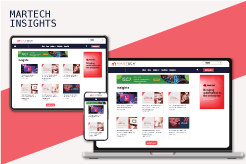Analysis of 15,000 websites finds an average of 297 accessibility issues per page, highlighting significant legal vulnerabilities across retail, hospitality, and other industries
AudioEye, Inc., the industry-leading digital accessibility company, announced the release of its 2025 Digital Accessibility Index, a comprehensive analysis of digital accessibility compliance across key industries including education, finance, government, healthcare, hospitality, software, and retail. Based on a review of 15,000 websites, the report found an average of 297 accessibility issues per page–a substantial increase from 37 issues per page found in AudioEye’s inaugural 2023 Index.
Marketing Technology Insights: Pipedrive Report AI Boosts Sales Teams With Smart Selling
This eightfold increase in issues detected is primarily due to improvements in AudioEye’s automated testing capabilities, which can test more of the Web Content Accessibility Guidelines (WCAG) than any other solution on the market.
“Many businesses don’t realize their accessibility compliance gap until they take a closer look at their websites,” said David Moradi, CEO of AudioEye. “This year’s Index reveals the true scale of digital inaccessibility, and the results are alarming. The surge in detected issues highlights the risks and legal exposure companies face. Businesses that rely solely on automation to meet accessibility requirements are leaving significant gaps that could lead to lawsuits, lost customers, and regulatory penalties. True compliance requires both cutting-edge technology and custom fixes from experts.”
Key Findings: Frequent Accessibility Issues Put Businesses at Risk
The 2025 Digital Accessibility Index reveals many accessibility failures related to website navigation and overall usability, significantly impacting the user experience for people with disabilities:
- 38% of images lacked proper alternative text (alt text), making it difficult for people with visual disabilities to interpret images, charts, and other non-text content.
- 80% of pages had links without clear descriptions, preventing screen reader users from understanding their purpose before clicking.
- 35% of pages had forms missing clear labels or instructions, creating obstacles for users relying on assistive technology to complete transactions, schedule appointments, or perform other tasks.
Marketing Technology Insights: StrataVision Launches AI Channel Partner and Referral Program
Impact of Accessibility Barriers Across Industries
The Index also highlights accessibility challenges across industries, many of which can disrupt essential user actions. A few examples from the report include:
- Retail: Retail websites had the highest number of accessibility issues across industries, with an average of 350.1 issues per page. Inaccessible product photos and mislabeled checkout forms hinder people with disabilities from completing purchases, impacting sales and customer acquisition.
- Hospitality: 41% of travel and hospitality webpages had accessibility issues that made it hard for keyboard-only users to navigate content, search, or make reservations–directly impacting their ability to book and modify travel.
- Healthcare: On average, healthcare sites had 272 issues per page, including inaccessible forms, labels, and buttons that make it difficult for patients to schedule appointments, complete forms, or access test results.
Laws such as the Americans with Disabilities Act (ADA) and the European Accessibility Act (EAA) establish clear accessibility requirements, and non-compliance can result in lawsuits, regulatory fines, and lost revenue. As digital accessibility enforcement increases globally, businesses must be proactive to ensure compliance and maximum legal protection.
Marketing Technology Insights: Afinida Marketing Doubles Staff to Meet Client Demand
Source – PR Newswire
For media inquiries, you can write to our MarTech Newsroom at news@intentamplify.com




